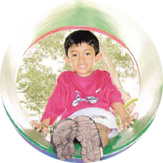Our children embody a past that is tied to two people who have decided to spend their lives together, and a future that holds a promise of great expectations.
An important part of the expectations that come along with parenthood is that our children develop to become the best they can be. For our children to develop to their potential, we as parents strive to give them the best that is within our means.
GETTING TO KNOW YOUR CHILD
If you really think about it, how many parents take the trouble to really get to know their children? Lets put you to the test:
- What is your child’s favourite cartoon character/colour/food/ pastime?
- What things does he/she like/ dislike?
- When is she at her best/worst mood or behaviour?
- What are her strengths/ weaknesses?
- Who does she relate to best?
- How can you tell if she is happy/sad?
How have you fared? If you missed most of the questions, then you have to do something, and fast. Getting to know your child better is an important step in ensuring that you bring out the best in them.
GREAT EXPECTATIONS
What are your expectations of your child? In fact, lets put up your expectations with that of your child’s, and compare the two. List 5 things you want from your child.
Then, ask your child: “If I am a magician who can grant you 3 wishes, what are your wishes?” List down the wishes.
Compare the list, and you’ll see that it’s a whole different world for children. They’re innocents venturing out to a new environment outside the home, and they therefore react and expect different things from this world.
The key to understanding this difference is understanding the needs of a child, in its entirety. Obviously, fulfilling physical needs is crucial to a child’s growth and development. Issues such as nutrition, shelter and protection are something most parents don’t even have to think about because it is the most basic prerequisite for bringing up a child.
However, in addition to fulfilling the physical needs of their children, parents are advised to do their best in meeting their emotional, cognitive and spiritual needs as well. These can help anchor children to a belief system that will complement the physical aspects of growth, and lead to a more secure attachment with parents. Children will have less difficulty in forming relationships with others and communicating their emotions.
POSITIVE PARENTING
Does all this mean that we have to be the perfect parent to our children? The reality is sobering.
Even if we give up our jobs to be full time parents, there’s little chance that we can be the perfect parent. All we can strive for is balanced parenting, where we acknowledge that we might not be perfect, but we’re good enough for the “job”.
In being a good enough parent, we will have to be vigilant in managing behaviours, communicating emotions and encouraging our children. We need to stop talking and start listening to our children occasionally. We must be mindful that choice and respect are essential in building a relationship with our children.
MANAGING BEHAVIOURS
Misbehaviour is basically a reflection of a child’s intentions. The child might just be seeking your attention. Conversely, they are a form of expressing frustrations and anger – whether it be due to a failed task or just wanting to get back at you. Misbehaviours may also be a form of power struggle, where a child is testing the limits of their independence from the parent.
When managing behaviours, it is always good practice to ignore bad behaviour while rewarding good behaviour with praises or tokens. Parents must stay calm at all times to avoid escalating anger. Stay clear of threats or even physical punishment.
COMMUNICATING WITH YOUR CHILD
It is best to keep things clear and concise. Use language that a child can understand, and it is a good idea to get the child to repeat back to you what has been said. Avoid sarcasm and criticism, and make sure that communication of emotions is consistent with your facial expression to avoid confusion.
An important part of the communication process with a child is the sharing of emotions. For example, share feelings with your child with sentences such as: “It’s okay to cry/feel sad”; “Mummy is upset with the mess you made”; “I feel proud you helped me tidy the living room”. The sharing process will help your child communicate emotions better, and it also allows you as a parent to express your love better to the child.
LISTEN TO YOUR CHILD
Listening to your child also entails spending time with your child doing the things he/she likes. Try and play with your child as often as you can. However, don’t take over proceedings – let the child lead the play. Play is a way children express their emotions, and it shows the way they see the world around them.
When communicating with your child, it’s a good idea to use reflective questions that can give you indications of what is going on. For example, say: “I’m not sure what makes you so grumpy today” rather than “Stop being so grumpy”. Prompts can also help with trying to make your child communicate his/her feelings. Try words such as: “You look so upset, is that what you feel right now?”
BUILDING SELF-ESTEEM
Self-esteem is an important component of a healthy personality. Always give encouragement to your child. Be positive in your encouragement. Do not say “Can’t you do anything right?” Instead, use words like “Good try.” It will make a world of difference to your child’s self esteem.
You may want to give your child certain responsibilities to help with the household. When you do, be patient and let your child finish tasks. You can assist in the task but not take over it. Always have realistic expectations of the ability of your child and never compare your child with others; your child has his or her own strengths and needs
CHOICE AND RESPECT
Choice and respect in a relationship nurtures self-esteem and confidence. This is no different in children. Treat children with respect. This means you should respect their belongings and privacy, and not do things like throwing away their old toys without negotiating with them, or making promises you know you can’t keep.
A part of cultivating choice and respect also involves involving children in some decision making. This makes them feel wanted and also respected because their decisions do matter. But make them well aware that decisions should not be made lightly and without any thought: they have to be responsible for their decisions.
In essence, what we all should be mindful of is to build a secure attachment with our children in early childhood as this forms the foundation for trusting relationships in adulthood. Do not doubt that it is a two-way process, and one which requires tremendous amounts of patience, love and understanding from parents.
Though we may be parents, we are all human and are subject to the vagaries of a life that can be filled with unexpected and occasionally nasty surprises. We are subject to anxiety, stress, even depression, and have to cope with it together with all the other responsibilities that adulthood entails. Parents should also take care of themselves. A parent who is under stress, experiencing depression or who is nearly burnout will not be able to carry out the ‘parenting job’ effectively.
But in bringing a child into this world, we have to be mindful that children will react to our insecurities. Hence, building a solid relationship with your child from early childhood could ease the pains that you and your child may experience. You need not strive to be the perfect parent; being a good enough parent should suffice.




Comments